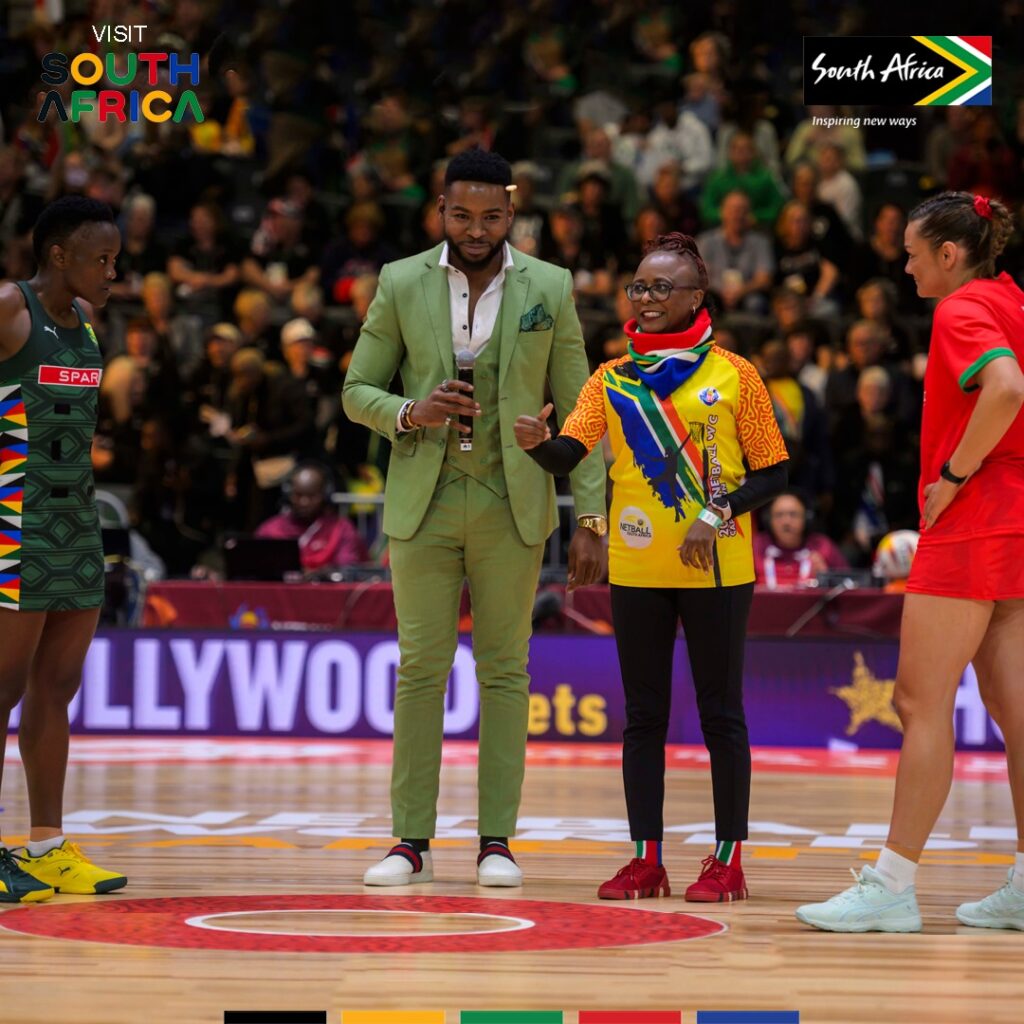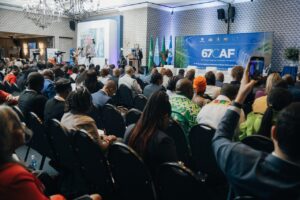Article by Nomasonto Ndlovu – Acting Chief Executive Officer of South African Tourism
As Acting CEO of South African Tourism, I am often drawn to the vibrant blend of experiences that our beautiful country offers to both domestic and international visitors. Among these, sports tourism has emerged as an exciting frontier with boundless potential. I have witnessed firsthand the transformation of our sports tourism, a sub-sector that isn’t merely a pastime but a vital part of our nation’s identity and economy. South Africa’s rich sports culture is more than just a game to us; it’s a passion, a unifier, and an economic powerhouse.
I recently posted on social platforms that I strongly believe that Sports tourism has the potential to change the trajectory of our tourism industry and fast-track tourism recovery following the COVID-19 pandemic. After that post, I received a flurry of messages and comments about this topic, and this prompted me to expand here on my thoughts on this matter.
Domestic Sports Tourism: Building a United Nation
South Africa’s domestic sports tourism landscape is flourishing, spurred by our rich history and cultural diversity. From the vuvuzela-sounding Premier Soccer League games, the heart-pounding games of the Vodacom Super Rugby to the thrilling cricket battles at the Wanderers, marathons, and cycling tours laced with the diverse and beautiful landscapes and the precision and majestic golf courses, catering to upscale clientele. Our sports events reflect our national character.
According to Future Market Insights, the value of the South African sports tourism market was estimated at US$3.67m for 2022. Local communities, small businesses, and the hospitality ecosystem are the real winners here, with substantial investments and opportunities cascading down to the grassroots level.
Our stadiums are not just arenas for games; they are melting pots of our Rainbow Nation, where our unity in diversity, and the joy of Freedom are celebrated.

International Sports Tourism: A Global Playing Field
South Africa’s sports culture isn’t confined to our borders; it echoes around the globe. With the successful hosting of numerous significant sporting events in recent years, including prestigious competitions like the 1995 IRB Rugby World Cup, the 1996 African Cup of Nations, the 2003 ICC Cricket World Cup, the 2007 World Twenty20 Championships, the 2009 Indian Premier League (IPL), the 2009 British and Irish Lions tour, the 2009 Confederations Cup, the 2009 ICC Champions Trophy, 2010 FIFA Soccer World Cup, The Cape Town ePrix and the 2023 Netball World Cup in Cape Town. The Cape Town ePrix, a Formula E racing sport, a street circuit race, showcasing the future of all-electric sport, which was successfully held in Cape Town, on the 25 February 2023, a first of its kind in South Africa, played right into our Sustainably proposition as a Tourism destination.
Successfully hosting these events has not only bolstered South Africa’s tourism infrastructure but also enhanced its standing as a global tourist destination and contributed tremendously into the local economy in a broader scale and attracted international tourists, but most importantly created much needed jobs.
But it’s not only about the numbers; it’s about the international relationships and networks built. Stakeholders, ranging from government to private sector, worked collaboratively, in unison to place South Africa on the global sports map. Add to this, our exceptional sports talent, where various talented South African sports stars have done amazing work using their Talent to place South Africa on the International stage. From Lucas Radebe, Bernie McCarthy, Ernie Els, Chester Williams, Caster Semenya, Siya Kolisi… the list is endless.
The Economic Impact: More than a Game
Sports tourism is more than an industry; it’s for many South Africans. Sports, has proved itself to be a catalyst for Economic Development, an investment driver with a huge ability to create much-needed jobs. From the local tavern, taxi’s, e-hailing services, and vendors outside stadiums, B&B’s, to the luxury hotels hosting international fans, the economic ecosystem of sports tourism is intricate and inclusive, and the Impact is far-reaching.
According to South African Tourism’s Departure Survey, sports tourism to South Africa has been a consistent mover of people. In 2010, South Africa welcomed 7.9 million tourists and more than 348 000 of those people were traveling primarily for sport chiefly driven by the 2010 FIFA World Cup, which was hosted in South Africa. The year before, almost 128 000 sports tourists arrived in South Africa primarily to attend the 2009 FIFA Confederations Cup. Sport tourism has continued to positively contribute to our arrivals. In 2019 (pre-pandemic), South Africa received a total of 10.2 million arrivals of which 53 640 were tourists traveling primarily either to attend or participate in a sporting event. In 2023 for the first six months, we saw more than 29 000 people travelling to South Africa for the same reasons contributing R0.6 billion to the country’s economy.
Domestically, sports tourism can ignite regional development, drive local economies, and instill a sense of shared national identity. The Comrades Marathon Association (CMA) estimated that the 2023 Comrades Marathon’s economic impact on Kwa Zulu-Natal alone was R550 million.
Our Sports Culture: A Mirror of Our Soul
South Africa’s sports culture is not just about the numbers or the games; it’s about our people. The Soweto Derby isn’t merely a football match; it’s a cultural festival. The Comrade’s Marathon isn’t just a race; it’s a symbol of human endurance. The blend of world-class golf courses with South Africa’s scenic beauty has made golf tourism a significant part of the country’s tourism industry. Our sports culture reflects our resilience, our hope, and our united vision for a better South Africa.
Team Players: The Essential Stakeholders
Undoubtedly, success in sport tourism is a collaborative effort, and I firmly believe in the synergy between various stakeholders:
a. Government Agencies: Their role in infrastructure development, regulations, and funding cannot be overstated.
b. Private Sector: From accommodation providers to travel agencies, their innovative packages and services enrich the tourist experience.
c. Sporting Bodies and Federations: Aligning with them ensures standardization, quality, and attraction of world-class events. They are key in the bidding processes.
d. Local Communities: Engagement with local communities ensures that the benefits of sport tourism trickle down to the grassroots level.
The Future: Endless Opportunities
Looking towards the future, I see endless opportunities for sports tourism in South Africa. The future of sports tourism in South Africa shines with promise and potential. With a rich legacy of hosting world-class events, a diverse array of scenic landscapes, and an enduring passion for sports that resonates nationwide, South Africa is poised to further solidify its position as a premier destination for sports enthusiasts. Governmental support, infrastructure development, and community engagement will play vital roles in harnessing this potential. By embracing innovative strategies, fostering inclusivity, and focusing on sustainability, South Africa can create a sports tourism model that not only elevates the economy but also inspires, unites, and celebrates the unique cultural heritage of the nation. The path ahead is not without challenges, but the momentum is building, and the opportunities are vast, laying the groundwork for a thriving and vibrant future in sports tourism.
In alignment to sports tourism, we (SA Tourism) have announced Springbok Captain, Siya Kolisi, as our new global advocate ahead of the Rugby World Cup starting in September in France. He is the perfect person to partner with South African Tourism in our marketing and promotional efforts as we seek to attract more travellers to come to visit our country.
The Winning Strategy: Enhancing Sport Tourism
To harness the full potential of sport tourism for both domestic and international appeal, we must:
1. Invest in Infrastructure: Developing modern, accessible sports facilities across urban and rural areas.
2. Strengthen Marketing Efforts: Showcasing South Africa’s sporting prowess and natural beauty to targeted audiences.
3.Promote Accessibility: Simplifying visa processes, enhancing transportation, and providing affordable packages will make South Africa an attractive destination.
4. Ensure Sustainability: We must ensure that our pursuit of sport tourism aligns with responsible environmental stewardship.
5. Prioritize Safety and Security: Implementing rigorous safety measures will foster a sense of trust and well-being among visitors.
Conclusion: Our Field of Dreams
As a South African, the growth and impact of sports tourism in our nation are personal to me. It represents our potential, our creativity, and our collective spirit. I see sports tourism as a conduit for social transformation, economic growth, and international unity. It has the power to transcend boundaries and resonate with people from all walks of life. It’s more than a game; it’s a story of our people, our land, and our future.
We are a nation with dreams as vast as our landscapes, and sports tourism is one field where those dreams are taking shape, one game at a time.
The field is open, and the time is now. Let’s play.
Author: Nomasonto Ndlovu – Acting Chief Executive Officer of South African Tourism








